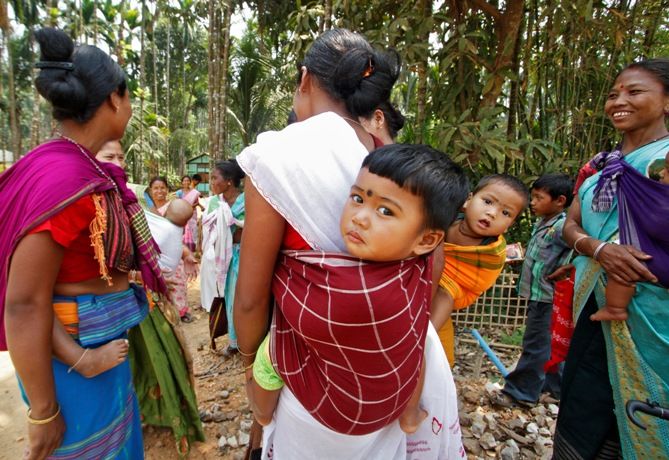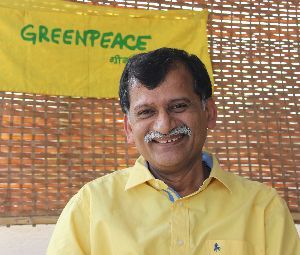
For whom is this development?
'And who bears the costs of the development?'
'These questions are not probed beyond the rhetoric.'
'Allegations about being anti-development mean very little when people in the country are still going hungry.'
Greenpeace India has been in turmoil with the Narendra Modi-led government accusing it of anti-development campaigns and also acting against India's economic security.
Its licence was cancelled, its bank accounts were frozen and Greenpeace India is not permitted to receive funds from abroad.
In spite of these setbacks, Greenpeace is determined to carry on its activities in India, primarily as a protector of the environment.
Ravi Chellam, below, left, Greenpeace India's new executive director, spoke to A Ganesh Nadar/Rediff.com about the organisation's plans.
The government cancelled your registration. What is the situation now?
The Registrar of Societies, Tamil Nadu, had cancelled the registration of the Greenpeace India Society, but we successfully challenged this in the Madras high court and got an unconditional stay order on November 20.
Your bank accounts have been frozen. How do you function?
It is important to make the distinction between funds received from abroad, and the funds we receive from hundreds of thousands of Indian supporters, people who believe in us and in our campaigns to secure a more sustainable future.
Since we had the restriction on accessing our foreign funds, Greenpeace India is now run entirely on the funds that we receive from domestic donors.
The bank accounts, which receive domestic funds, have not been frozen.
However, on April 9 last year the government froze all our bank accounts; as you can imagine, this pushed us into an untenable situation, and had a direct impact on our staff, as well as our campaigns.
But on May 27, the Delhi high court ruled in our favour, and unblocked two primary bank accounts enabling access to domestic funds.
The continuing contributions of our Indian supporters have helped us to continue functioning, and, in fact, winning some important campaign victories.
 Since funds from abroad are stopped, it must have affected operations.
Since funds from abroad are stopped, it must have affected operations.
Since 2014, Greenpeace has been at the receiving end of a barrage of sanctions by government agencies.
Thanks to the supporters we've found domestically, for which full credit goes to our fantastic fundraising team which has worked tirelessly, we have managed to keep Greenpeace India and its campaigns for clean air, water, and tribal rights alive.
You have been accused of anti-development campaigns. How are you going to work around that?
Allegations about being 'anti-development' mean very little when the fact of the matter is that people in the country are still going hungry and the environment is getting degraded and destroyed.
These accusations seem inevitable when we challenge or even examine the definitions of economic growth and development -- both of which are only vaguely defined.
What is growth?
For whom is this development?
Who actually enjoys the fruits of development?
And who bears the costs of the development?
These questions are not probed beyond the rhetoric.
However, I do not want to engage in rhetorical debates about nationalism and development. All I can say is that we mean well for India -- its environment and its weak and poor.
We will continue to keep working on our mission, and keep up our campaigns.
What about your local contributors? Are the donations still coming in?
Most of our domestic donors contribute between Rs 350 and Rs 750 every month.
Your people have been stopped from going abroad, people coming to meet you from outside the country have been stopped from coming here. How do you plan to manage these restrictions?
Thanks to the support we have received from the judiciary, which has upheld our rights in every instance, these restrictions have been recognised as illegal and been overturned.
Last year when Greenpeace campaigner Priya Pillai filed a writ petition in the Delhi high court against being 'offloaded' from a London-bound flight, the court had called the act 'undemocratic' and stated 'you cannot muzzle dissent in a democracy.'
In effect, although strong arm tactics do cause inconvenience, they have not been able to stop us from carrying out our campaigns.
Every time the government takes action against you, you move the courts. Are there any other options?
We routinely explore all options within Constitutional means, to secure justice and uphold our right to campaign.
Yes, we have needed to turn to the courts six times since 2014, and are proud to say that each time the courts have ruled in our favour, restoring our faith in these processes and in our country's judiciary.
But equally, there is a broad range of issues on which we engage with a variety of government agencies, including our welcoming the announcement of ambitious renewable energy targets, while continuing to uphold our right to dissent. As many of these are ongoing discussions it wouldn't be appropriate to list them all right now
Have all your employees stayed with you in these trying times?
Clearly there has been an impact, not just on numbers, but also on the morale of staff and the inevitable reduction in staff that followed.
The fact of the matter is that some people felt compelled to leave us, and with that a lot of talent, institutional memory, and relationships have gone.
But the people who have stuck it out have done so, largely because they have faith and commitment to the mission of Greenpeace.
What are your future plans?
My priorities are to uplift the internal atmosphere of the organisation, strengthen internal systems and processes and also work on how we are being perceived from the outside.
We need to demonstrate how we touch individual lives with our work and make these links more visible.
I would also like to increase our focus in some key areas. Apart from the challenges we face vis a vis wildlife and biodiversity, I also want to focus on engaging with the younger generation, and bring them face to face with the real issues that pose an imminent threat to our very existence.
A good starting point perhaps is the issues that affect their daily lives: Be it air pollution or irresponsible garbage disposal, the urban space is getting worse by the minute.
Our urban solutions campaign, for instance, has been successful in working with resident welfare associations by initiating things like garbage segregation, composting and water conservation.
Our campaigns on air pollution, chemicals-free agriculture and solar energy are also gaining a lot of momentum and great support, and I am confident these will continue to resonate with our supporters.









